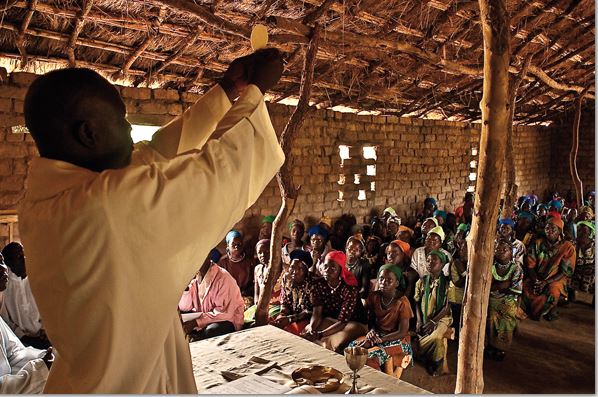18-01-2020
Mission in Africa: challenges and hopes
di Pontian Kawesa *

Evangelization in Africa mission has moved from being overly dependent on foreign missionaries from the “older Church of Europe and Canada to a well-trained indigenous clergy, the religious (men and women) as well as lay leaders and catechists. The African adherence to family and community values is a strong support that anchors the official church structures
By mission, “mission”, is meant that action of being sent, going out to announce the Gospel, the Good News of salvation that is embedded in the Paschal Mystery of Jesus Christ. In Africa, this mission which at different stages was initiated by different European missionaries in the different parts and cultures of this once called “dark continent” is on-going. The promotion of this mission has moved from being overly dependent on foreign missionaries from the “older Church of Europe and Canada to a well-trained indigenous clergy, the religious (men and women) as well as lay leaders we call Catechists. The African adherence to family and community values is a strong support that anchors the official church structures: Dioceses, Parishes, Sub-parishes or Outstations that now stride the whole length and breadth of Africa and Madagascar. Thus we have SECAM: Symposium of Episcopal Conferences of Africa and Madagascar. It is within this broad scope, with rich and vibrant ethnic and cultural diversities that mission ad intra and ad gentes continues to take place. This mission in Africa has not only borne African missionaries to fellow Africans, as well as to other mission lands, new and old, it has also through the blood of African martyrs, those of North Africa in earlier times, and those of more recent times like the Uganda Martyrs and saints, have watered the seed of the Christian faith and mission. The insight of Pope Benedict XV in his Apostolic Letter, Maximum Illud (30 November 1919) of having indigenous bishops, priests, men and women religious as well as lay leaders or missionaries, found a resonance in the prophecy of Pope St. Paul VI, when he said that Africans must become missionaries to themselves (July 1969 as he launched SECAM). Now Africa has many vocations to the priesthood and religious life; seminaries and houses of formation are full to capacity in many countries. Hence, there is hope for continued mission in Africa.
The Challenges to mission in Africa are many but we can mention the following:
1) The gospel message has not gone far enough or penetrated enough in the cultures, practices and hearts of some people in Africa; there is more need on the one hand to proclaim authentically the Good News and to assimilate it authentically on the other hand. Practicing Catholics are fewer than baptized Catholics.
2) Some people and their cultures adhere to their traditional pagan beliefs and gods and they are closed in on themselves; they are not open to the light of Christ contained in the mission of the Church.
3) While Pentecostalism and Evangelicalism seem to have good and practical strategies for their mission and do attract many people (and sadly, fallen away Catholics), some of their doctrines and practices are in sharp contrast to what the Catholic Church practices and teaches. This has led to more confusion about the mission of Christ and our mission. The growth of these Pentecostal and Evangelical Churches is a liability to the carrying out of mission in the Catholic understanding. Why are many Catholics going over to these churches and remain?
4) Every effort must be made to ensure the full evangelization of culture especially in this age where Pope Francis has termed the present as the ‘throwaway culture’. Some African cultures and practices need the message and light of Christ. Dialogue and Inculturation must also be lines of engagement.
5) In Africa, the Church has not yet contended with the fact that Mission is Capital Intensive. There are so many Church activities in the apostolate that need much financing. Africans must learn to give not only of themselves but resources to further the work of mission. Much as they receive, they must also give. We also need to do more instruction in Mission Cooperation and Animation according to the spirit of St. Paul (2 Cor. 8:1ff).
6) Migration due to many factors like wars, economic hardships and unemployment.
7) Other challenges include immigration problems, Refugees, wars, HIV/AIDS, Famine, Radicalized religions, Terrorism and Kidnaping, which not only displace people but also complicate doing mission which is so crucial in such circumstances.
Hopes for the future of evangelization in Africa are:
1) The Church in Africa is considered young and vibrant and still attractive. It will continue to grow as the mission gets understood and carried out.
2) The Small Christian Communities will continue to be the basis of evangelization. On-going formation for the clergy, religious men and women and the training of catechists and all the baptized will go a long way to make the mission of the Church in Africa evangelically renewed and established in a state of permanent mission. This is what Pope Francis in the Apostolic Exhortation Evangelii gaudium, exhorts us to do, to carry out a “missionary conversion” within us springing from the heart of the Gospel.
3) The Church as family of God in Africa will continue to draw its inspiration and ardor from the natural family that continues to be the cradle of the gift of life in Africa.
4) Reconciliation and Peace should be the new norm guaranteed by the authentic mission of Jesus who is the King of Peace per excellence.
The Challenges to mission in Africa are many but we can mention the following:
1) The gospel message has not gone far enough or penetrated enough in the cultures, practices and hearts of some people in Africa; there is more need on the one hand to proclaim authentically the Good News and to assimilate it authentically on the other hand. Practicing Catholics are fewer than baptized Catholics.
2) Some people and their cultures adhere to their traditional pagan beliefs and gods and they are closed in on themselves; they are not open to the light of Christ contained in the mission of the Church.
3) While Pentecostalism and Evangelicalism seem to have good and practical strategies for their mission and do attract many people (and sadly, fallen away Catholics), some of their doctrines and practices are in sharp contrast to what the Catholic Church practices and teaches. This has led to more confusion about the mission of Christ and our mission. The growth of these Pentecostal and Evangelical Churches is a liability to the carrying out of mission in the Catholic understanding. Why are many Catholics going over to these churches and remain?
4) Every effort must be made to ensure the full evangelization of culture especially in this age where Pope Francis has termed the present as the ‘throwaway culture’. Some African cultures and practices need the message and light of Christ. Dialogue and Inculturation must also be lines of engagement.
5) In Africa, the Church has not yet contended with the fact that Mission is Capital Intensive. There are so many Church activities in the apostolate that need much financing. Africans must learn to give not only of themselves but resources to further the work of mission. Much as they receive, they must also give. We also need to do more instruction in Mission Cooperation and Animation according to the spirit of St. Paul (2 Cor. 8:1ff).
6) Migration due to many factors like wars, economic hardships and unemployment.
7) Other challenges include immigration problems, Refugees, wars, HIV/AIDS, Famine, Radicalized religions, Terrorism and Kidnaping, which not only displace people but also complicate doing mission which is so crucial in such circumstances.
Hopes for the future of evangelization in Africa are:
1) The Church in Africa is considered young and vibrant and still attractive. It will continue to grow as the mission gets understood and carried out.
2) The Small Christian Communities will continue to be the basis of evangelization. On-going formation for the clergy, religious men and women and the training of catechists and all the baptized will go a long way to make the mission of the Church in Africa evangelically renewed and established in a state of permanent mission. This is what Pope Francis in the Apostolic Exhortation Evangelii gaudium, exhorts us to do, to carry out a “missionary conversion” within us springing from the heart of the Gospel.
3) The Church as family of God in Africa will continue to draw its inspiration and ardor from the natural family that continues to be the cradle of the gift of life in Africa.
4) Reconciliation and Peace should be the new norm guaranteed by the authentic mission of Jesus who is the King of Peace per excellence.
* nota sull'autore
National PMS Director of Uganda 

 Sommario
Sommario